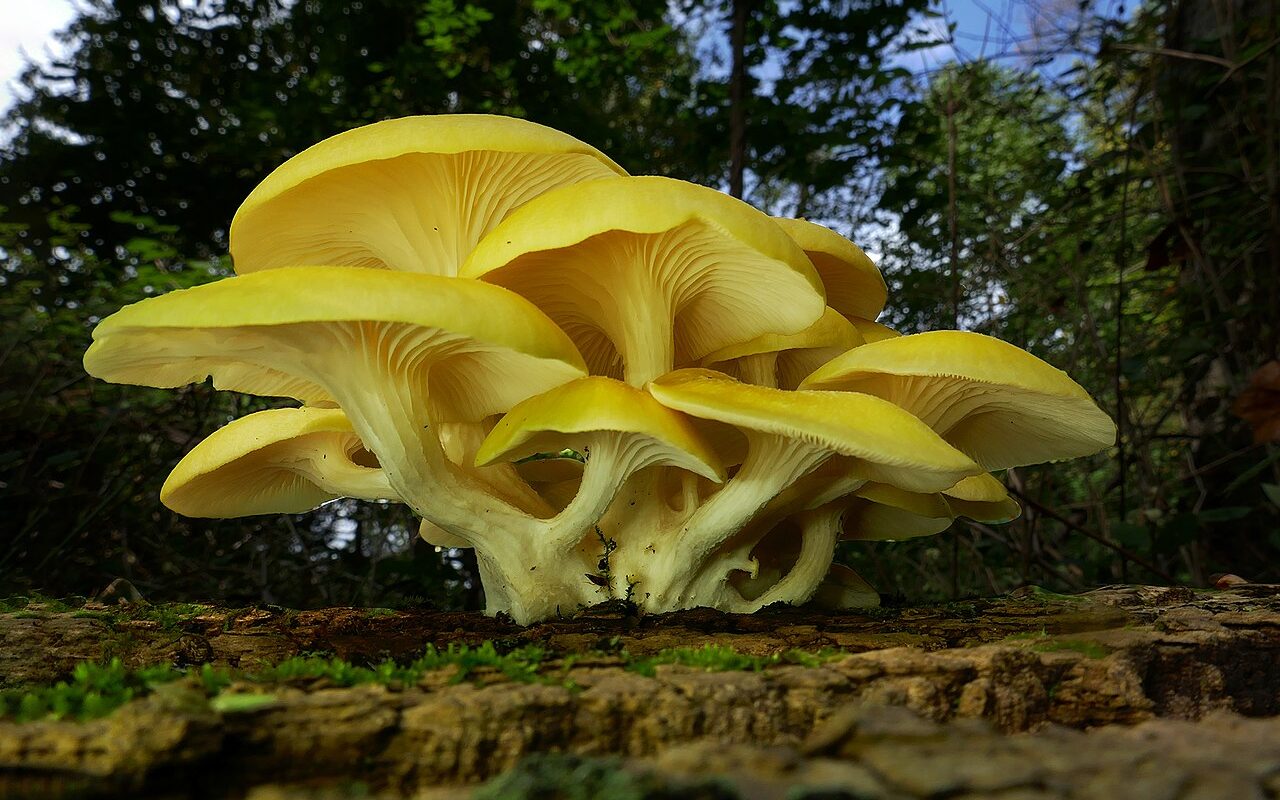Golden oyster mushrooms spreading in Michigan raise alarms about native fungi loss, prompting DNR and EGLE warnings and public reporting efforts.
Bright Yellow Fungus From Home Grow Kits Now a Forest Menace
What started as a culinary trend is now a growing environmental concern in Michigan. Golden oyster mushrooms (Pleurotus citrinopileatus), a species native to Asia and Eastern Russia, are establishing themselves in Michigan’s forests, raising alarms about their invasive potential and the threat they pose to native fungal ecosystems.
Originally introduced to the U.S. through popular grow kits in the early 2000s, these mushrooms began appearing in the wild by 2010. Today, confirmed sightings have reached the southern Lower Peninsula, according to researchers cited by the Michigan Department of Environment, Great Lakes, and Energy (EGLE) and the Department of Natural Resources (DNR).
Michigan Researchers Urge Reporting as Spread Accelerates
Ecologists from the U.S. Forest Service and the University of Wisconsin-Madison report that golden oyster mushrooms are altering the fungal diversity in forests. Aishwarya Veerabahu, a fungal ecologist and graduate researcher at UW-Madison’s Department of Botany, is studying their spread.
Veerabahu’s team found that in Wisconsin forests where these mushrooms had colonized dead logs, native fungal diversity was reduced by half. That same pattern could now be repeating in Michigan’s woods.
“No one knows exactly how golden oyster mushrooms escaped into the wild—whether from a grow kit, a commercial farm, or outdoor logs used for home cultivation,” said Veerabahu.
The DNR is asking Michigan residents to report sightings through iNaturalist.org, a global biodiversity tracking platform, to help scientists monitor the spread.
Loss of Fungal Diversity Could Disrupt Medicine and Ecosystem Functions
Fungi are more than decomposers. They play a critical role in nutrient cycling, soil health, and even human medicine. Veerabahu warns that invasive fungi may push out native species with potential medical applications.
“Fungi are sources of revolutionary medicines, including antibiotics like penicillin, cholesterol medication and organ transplant stabilizers,” she said. “The value of undiscovered, potentially useful chemicals can be lost when invasive species push others out.”
This warning echoes concerns voiced in previous studies about invasive species disrupting bioprospecting—research aimed at discovering new compounds in nature. If golden oysters dominate certain ecosystems, scientists may lose access to unique, as-yet-unidentified fungi native to Michigan’s hardwood forests.
Michigan’s Role in Controlling the Invasive Spread
Michigan residents may unknowingly contribute to the problem by composting spent mushroom grow kits or inoculated logs outdoors. Veerabahu recommends avoiding golden oyster kits entirely, or at minimum, cultivating them only indoors and disposing of the remnants properly.
“If you enjoy growing mushrooms at home, try cultivating safe, native species that you have lawfully collected in your region,” she advised.
This advice aligns with broader recommendations from invasive species management groups, which warn against releasing non-native plants, pets, or fungi into the environment.
Golden Oyster Mushrooms: From Gourmet Trend to Ecological Risk
Golden oyster mushrooms are prized in restaurants and home kitchens for their vibrant yellow caps and nutty flavor. Cooking videos and online marketplaces helped fuel their popularity, especially during the pandemic-era surge in home food production.
But their attractive qualities may be overshadowed by their ecological cost. Michigan forests, already stressed by invasive plants, pests like the emerald ash borer, and climate shifts, now face yet another challenge.
EGLE and the DNR are asking Michigan’s mushroom enthusiasts and forest users to be proactive in limiting the spread.
To learn more, Veerabahu’s original article in The Conversation offers detailed findings from the U.S. Forest Service study and outlines additional recommendations for growers and landowners.
Read More Interesting Feature Stories From ThumbWind
- Michigan Feature News Stories – Unveiling the diverse and vibrant people, captivating places, and remarkable events that come together to make the Great Lake State unique.
- Strange Political News – A sarcastic take on official news from around the U.S., exploring the absurdities that often arise in the political landscape while providing a humorous perspective on current events and highlighting the quirks of politicians and policies.
- Michigan Hometown News – News and events from Michigan’s Upper Thumb region worth knowing, including local stories, impactful interviews, and updates on community happenings that shape the culture and lifestyle of the area.
Your Turn – Like This, or Hate it – We Want To Hear From You
Please offer an insightful and thoughtful comment. We review each response. Follow us to have other feature stories fill up your email box, or check us out at ThumbWind News




